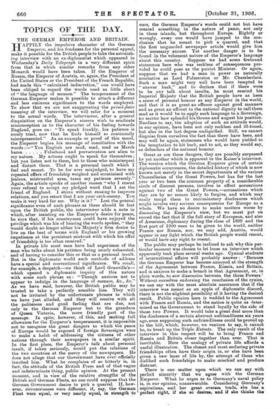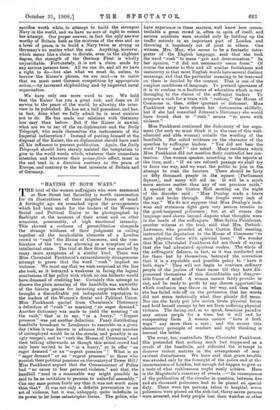TOPICS OF THE DAY.
THE GERMAN EMPEROR AND BRITAIN. HAPPILY the impulsive character of the German Emperor, and his fondness for the personal appeal, make it possible for the British people to take the astonish- ing interview with an ex-diplomatist which appeared in Wednesday's Daily Telegraph in a very different spirit from that in which similar remarks from any other Monarch would have been taken. If the Emperor of Russia, the Emperor of Austria, or, again, the President of the -United States or the President of the French Republic, had made this "calculated indiscretion," one would have been obliged to regard the words used as little short of "the language of menace." The temperament of the German Emperor makes it possible to attach a different and less ominous significance to the words employed. To show that we are not exaggerating the primtl-facie meaning of the interview, we will refer for a moment to the actual words. The interviewer, after a general disquisition on the Emperor's sincere wish to eradicate misconception as to the character of his feeling towards England, goes on : "To speak frankly, his patience is sorely tried, now that he finds himself so .continually misrepresented." As an example or proof of this mood, the Emperor begins his message of conciliation with the words :—" You English are mad, mad, mad as March hares Falsehood and prevarication are alien to my nature. My actions ought to speak for themselves ; but you listen not to them, but to those who misinterpret and distort them. That is a personal insult which I feel and resent. To be for ever misjudged, to have my repeated offers of friendship weighed and scrutinised with jealous, mistrustful eyes, taxes my patience severely." Again, the article speaks of another reason "why I resent your refusal to accept my pledged word that I am the friend of England. I strive without ceasing to improve relations, and you retort that I am your arch-enemy. You make it very hard for me. Why is it ? " Lest the general significance even of such phrases as these should be lost upon the British public, the interviewer adds a note in which, after insisting on the Emperor's desire for peace, be says that, if his countrymen could have enjoyed the privilege which was his of hearing the words spoken, "they would doubt no longer either his Majesty's firm desire to live on the best of terms with England or his growing impatience at the persistent mistrust with which his offer of friendship is too often received." In private life most men have had experience of the man who talks about his patience being nearly exhausted, and of having to consider this or that as a personal insult. But in the diplomatic world such methods of address have a special and conventional significance. We recall, for example, a despatch—we think of Lord Granville's- which opened a diplomatic inquiry of this nature with some such phrase as : "Though anxious not to appear to indulge in the language of menace, &c., &c." As we have said, however, the British public may be trusted to take a perfectly sensible line. They will not be irritated by the unfortunate phrases to which we have just alluded, and they will receive with all the politeness and good feeling that are due, not only to the German Emperor but to the grandson of Queen Victoria, the more friendly part of the message. In spite, however, of this, and making full allowance for the Emperor's temperament, it is impossible not to recognise the great dangers to which the peace of Europe would be exposed if foreign Sovereigns were to make a habit of addressing the citizens of other nations through their newspapers in a similar spirit. In the first place, the Emperor's talk about personal insult, if taken seriously, would put the relations of the two countries at the mercy of the newspapers. He does not allege that our Government have ever officially insulted him. What be complains of so bitterly is, in fact, the attitude of the British Press and of that vague and indeterminate thing, public opinion. At the present moment, and in view of the relative strengths of the British and German Fleets, no one could suppose that the German Government desire to pick a quarrel. If, how- ever, circumstances were different, if, say, the German Fleet were equal, or very nearly equal, in strength to ours, the German Emperor's words could not but have created something in the nature of panic, not only in these islands, but throughout Europe. Rightly or - wrongly, every one would have jumped to the con- clusion that he meant to pick a quarrel, and that the first unguarded newspaper article would give him the necessary excuse. Yet another danger is to be found in the vehement nature of the Emperor's language about this country. Suppose we had some firebrand statesman here who was reckless of consequences pro- vided he could pose as the patriot Minister. Or again, suppose that we had a man in power as naturally combative as• Lord Palmerston or Mr. Chamberlain. Such a man might very well have been tempted to "answer back," and to declare that if there were to be any talk about insults, he must remind his Imperial Majesty that the British people have as keen. a sense of personal honour as any Emperor in the world, and that it is as great an offence against good manners and as great an affront to the national dignity to call them mad as it would be to apply such language to a Sovereign, no matter how splendid his throne and august his position. Needless to say, the adoption of such an attitude would, in our opinion, have been not only reckless and ill-timed, but also in the last degree undignified. Still, we cannot disguise from ourselves the fact that there have been, and may well be again, statesmen who would have yielded to the temptation to hit back, and to act, as they would say, as defenders of the national honour.
Great as are these dangers, they are possibly surpassed by yet another which is apparent in the Kaiser's interview. The version which the German Emperor gives of certain diplomatic occurrences, the detailed history of which is now known not merely in the secret departments of the various Chancelleries of the Great Powers, but has for the last year or two been the common property of a considerable circle of discreet persons, involves in effect accusations against two of the Great Powers,—accusations which they are by no means likely to forgive, and which may easily tempt them to recriminatory disclosures which might involve very serious consequences for Europe as a whole. We have no desire to make matters worse by discussing the Emperor's view, but we must put on record the fact that if the full story of European, and also of American, diplomacy during the close of 1899 and the first part of 1900 were to be given to the world, neither France nor Russia, nor, we may add, Austria, would appear in any light which the British people would resent, or would have any right to resent.
. The public may perhaps be inclined to ask why this par- ticular moment was chosen to let loose an interview which apparently took place several weeks ago. Cynical students of international affairs will probably answer : 'Because the German Emperor has become annoyed at the strength of the Agreement between France, Russia, and Britain, and is anxious to make a breach in that Agreement, or, in plain words, to sow dissension between the three Powers.' Without ourselves endorsing the conclusion of the cynics, we can say with the most absolute assurance that if the interview was meant as an apple of diplomatic discord, there is not the slightest possibility of it having the desired result. Public opinion here is wedded to the Agreement with France and Russia, and the nation is quite as deter- mined as the Government to stand loyally by the side of those two Powers. It would take a great deal more than the disclosure of a certain abstract unfriendliness six years ago, even supposing such unfriendliness could be proved up to the hilt, which, however, we venture to say, it etinnot be, to break up the Triple Entente. The only result of the interview in this respect will be to bring France and Russia and Britain closer together, than ever. That is inevitable. Here the analogy of private life affords a useful illustration. The closest and most enduring private friendships often have their origin in, or else have been given a new lease of life by, the attempt of those who disliked such friendships to make mischief and produce distrust.
There is one matter upon which we can say with perfect sincerity that we agree with the German Emperor. What he urges as to Germany's naval policy is, in our opinion, unanswerable. Considering Germany's aspirations, and her great oversea trade, she has a perfect right, if she so desires, and if she thinks the' sacrifice worth while, to attempt to build the strongest Navy in the world, and we have no sort of right to resent her attempt. Our proper answer, in fact the only answer worthy of Britain both as the mistress of the seas and as a lover of peace, is to build a Navy twice as strong as Germany's no matter what the cost. Anything, however, which seems like a claim to dictate, even in the slightest degree, the strength of the German Fleet is wholly unjustifiable. Fortunately, it is not a claim made by any serious persons here. All we can do, and all we have a right to do—but also what we must do, unless, to borrow the Kaiser's phrase, we are mad—is to insist that we must meet German competition by appropriate action,—by increased shipbuilding and by improved naval organisation.
We have only one more word to say. We hold that the Kaiser has run a great risk, and done an ill service to the peace of the world, by allowing the inter- view to be published. He has set a bad precedent, and has, in fact, done what we fully admit he is most anxious not to do. He has made our relations with Germany less easy than before. But if the Kaiser is unwise, what are we to say of the ex-diplomatist and the Daily Telegraph, who made themselves the instruments of the Imperial indiscretion ? Instead of putting himself at the disposal of the Kaiser, the ex-diplomatist should have used all his influence to prevent publication. Again, the Daily Telegraph should have sternly resisted the temptation to give to the world words which, whatever their immediate intention and whatever their primalocie effect, must in the end tend in a direction contrary to the peace of Europe, and contrary to the best interests of Britain and of Germany.















































 Previous page
Previous page